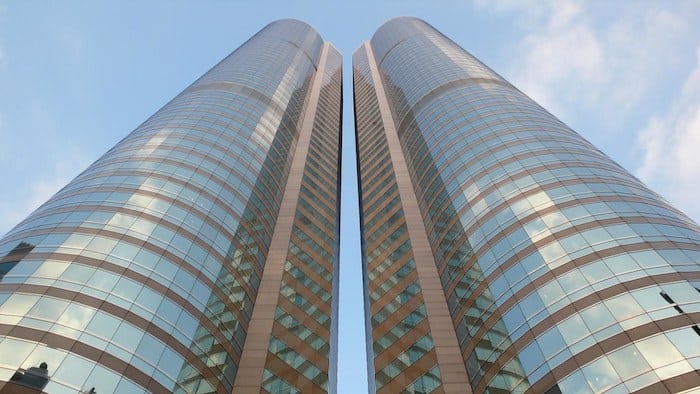
Hongkong Land’s portfolio includes Exchange Square in Central
Hongkong Land, the biggest landlord in Hong Kong’s Central district, saw its underlying profit rise to a record $1.1 billion last year, but warned this month that the coronavirus outbreak would hit the firm’s business in 2020.
The division of Hong Kong’s Jardines Group, in announcing its 2019 results to the London stock exchange on 5 March, said that, despite the 4 percent rise in its underlying profit, losses of $878 million — primarily from lower valuations of its investment properties — had seen profit attributable to shareholders plunge 92 percent for the year. The profit figure dropped to $198 million in 2019 from $2.5 billion a year earlier.
The London-listed company recommended a final dividend to its shareholders of 16 US cents per share, giving a total dividend for the year of 22 US cents per share. The profit distribution would be the same as what the company handed over to shareholders in 2019, based on Hongkong Land’s net asset value of $16.39 per share at the end of 2019.
Facing COVID-19 After a Turbulent 2019
The announcement by the owner of Jardine House, Exchange Square and other cornerstones of the world’s most expensive commercial district follows a turbulent year in the Asian financial hub, which saw commercial landlords squeezed by six months of anti-government protests.
Despite the city’s social unrest, chairman Ben Keswick said that earnings from the company’s investment properties, which account for 87 percent of Hongkong Land’s gross assets, remained stable.
However, he warned that the effects of the coronavirus outbreak are expected to impinge on the performance of the company’s retail properties this year, particularly in Hong Kong, as well as its development projects in mainland China.

Chairman Ben Keswick warned that the company’s coffers would be hit in 2020 by COVID-19
“The extent of the impact will be dependent on the duration and geographic extent of the outbreak,” Keswick said.
Chief executive Robert Wong noted in the company’s stock exchange disclosure that Hongkong Land had temporarily halted development projects in mainland China as a result of the virus outbreak, while the firm’s retail properties – including the Landmark in Hong Kong – were suffering from lower turnover.
Rising Rents, Climbing Vacancy in Central
Despite the constant flow of bad news in its home city, Keswick said that Hongkong Land’s “resilient” Central portfolio, which is spread across 12 interconnected buildings in the heart of Hong Kong’s financial district, had seen stable returns for the year.
Average rents across Hongkong Land’s 450,000 square metre (4.8 million square foot) of office space in Central increased by 4 percent to HK$118 ($15.18) per square foot per month in 2019 from HK$113 a year earlier.
With leasing stalling in the district – which saw vacancy rates climb to its highest level ever in January – the company said its Central office portfolio’s vacancy rate rose from 1.4 percent at the end of 2018 to 2.9 percent at the end of last year.
There was better news in terms of lease lengths, with Hongkong Land reporting that it had lifted the average weighted average lease expiry across its Central offices to 4.7 years at the end of 2019, from 4 years in 2018.
Leasing relief in the face of street protests and vanishing mainland shoppers in Hongkong Land’s Central retail portfolio put a dent in average rents last year, despite the properties being fully occupied. Average rental rates for 2019 dropped 5 percent from the year before to HK$222 per square foot per month, according to the company’s stock exchange filing.
Declining Profit in Singapore, Ramping Up China Pipeline
The company said its Singapore portfolio, which covers 165,000 square metres of office space, suffered a fall in profit in 2019 as vacancy rates in its properties crept upwards from 2.5 percent in 2018 to 5 percent at the end of 2019.
This rising vacancy rate offset a 4 percent increase in average rent, which climbed from S$9.3 ($6.7) per square foot in 2018 to S$9.7 per square foot at the end of last year.
In China, where Hongkong Land paid a record RMB 31.05 billion ($4.48 billion) for a commercial development site in Shanghai just last month, the company acquired five residential sites during the year with a combined developable area of 547,000 square metres, according to the company’s full-year results.
The commercial site in Shanghai, which is located on the banks of the Huangpu River in Xuhui district , is expected to yield 1.09 million square metres of above-ground gross floor area, with an expected completion date of 2027.
The company’s debt, which stood at $3.6 billion at the end of 2019, was broadly unchanged from the end of 2018, giving the company a net gearing of 9 percent.
That site in Shanghai bothers me, such an odd acquisition. About 15 years too late to enjoy any real uplift in value and a far from prime location. What is the game plan there?
I don’t think HK Land are particularly smarter than anyone else, they’ve been more lucky than ‘smart’ in Hong Kong. But there must be a strategy in Shanghai, what is it? Are they investing third party money and taking fees?